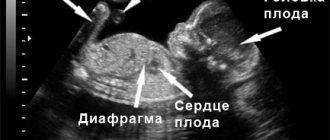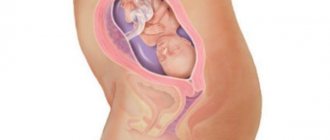Runny nose during pregnancy in the 1st trimester
Pregnancy in women is accompanied by serious hormonal changes caused by an increase in the level of estrogen and progesterone necessary for bearing a child and its normal intrauterine development. At the same time, the volume of circulating blood in a woman’s body increases. This affects the condition and functions of many organs and systems. The result of an increase in blood volume and an increase in the level of female sex hormones is swelling and thinning of the mucous membrane of the nasal sinuses, which leads to the formation of congestion.
In this case, the nasal mucosa becomes dry and irritated. Negative factors - dust, dry air, chemicals contained, for example, in air fresheners, only increase swelling of the nasal sinuses and cause a runny nose, which can accompany a woman throughout pregnancy. Nasal congestion and flow significantly complicate breathing, reduce the supply of oxygen, the lack of which causes headaches and, moreover, negatively affects the development of the fetus. All this, together with a weakened immune system, explains the cause of frequent runny noses and colds in pregnant women.
Viral diseases are very dangerous for a pregnant woman and fetus. In the first trimester of pregnancy, miscarriages often occur due to infectious diseases. Therefore, if a runny nose appears during pregnancy in the early stages, especially accompanied by an increase in body temperature, cough, sore throat - integral companions of colds and acute respiratory viral infections - you must immediately consult your doctor. Under no circumstances should you self-medicate, since most medications are contraindicated for use in the 1st trimester of pregnancy. Self-medication can cause irreparable harm to the developing fetus and negatively affect its health.
Another cause of a runny nose during pregnancy in the 1st trimester is allergies. During pregnancy, the body's sensitivity increases significantly, so an allergic runny nose in this situation is not uncommon. It manifests itself especially strongly during the spring flowering period of plants. In addition to pollen, allergies can be caused by air pollution, animal dander, cosmetics and other factors. Treatment of allergic rhinitis should also not be delayed, otherwise it will become chronic, and this is unsafe for the baby; the disease can be transmitted to him.
A runny nose can also be caused by tumor formations, anatomical features of the nasopharynx, adenoids, polyps, nasal injuries, stress and depression, diseases of the cardiovascular system, long-term treatment with certain medications, chronic diseases of the nasopharynx (tonsillitis, pharyngitis, sinusitis).
Since it is in the first trimester that the main organs and systems of the fetus are formed, any medications are taken only in extremely severe cases. Therefore, it is recommended to start treating a runny nose with folk remedies that have virtually no contraindications and do not pose a threat to the baby and his mother.
Features of treatment of any type of rhinitis in pregnant women
For any types and manifestations of rhinitis, warming procedures should not be used:
electrophoresis,- mustard leaves,
- hot compresses,
- warming baths and steam rooms in baths.
As a rule, viral rhinitis is treated with antibiotics and immunostimulants. But this should not be done during pregnancy - there is a high risk of harming the health of the fetus. Even vitamin preparations, honey and herbs can only be used after medical consultation.
Moisturizing is helpful and safe to relieve rhinitis symptoms. If the air is dry, it provokes sneezing and itching. To normalize the microclimate in the room, you can use household humidifiers. A towel moistened with water and placed on the heater will also help.
Rinsing the nose can be done not only with mineral water and saline solutions, but also with decoctions of chamomile and calendula. It is important to be careful not to have an allergic reaction to these herbs.
For rinsing, you can purchase special devices, pears, etc. at the pharmacy. It is convenient to use a large-volume syringe without a needle. A woman can perform the procedure by sucking solutions from a saucer or using a teapot.
You cannot take medications on your own, even nasal drops. Only after consultation with obstetricians and gynecologists and under their supervision.
Traditional methods and massage
Steam inhalations with potatoes provide a lasting effect. You can use honey, onion and garlic. The beekeeping product is mixed with water in a ratio of 1 to 5.
It is good if essential oils such as fir, sea buckthorn, peach, conifers, lavender, rosehip and sage give a positive result after the first use. This means that we can continue to use these means. But if, after using them, rhinitis only worsens, this may be an allergic manifestation and therapy in this way should be stopped. To prepare drops with these esters, you need to dilute them with other oils - for example, olive. For mixing, use a ratio of 1 to 20. Fewer esters are taken.
Symptoms of any rhinitis can be cured by acupressure. It is performed on the nose, around it and on the forehead. To increase effectiveness, you can use runny nose balms, for example “Zvezdochka”, but in very small quantities. It is necessary to make circular movements for 4-6 seconds near the wings of the nose, on the bridge of the nose, in the area of the maxillary sinuses, on the tip of the nose and just above the area between the eyes.
Treatment with medications
Nasal discharge is usually suppressed with vasoconstrictor drops. But it is impossible to treat rhinitis this way during pregnancy. Obstetricians urge you not to do this. The thing is that the fetus already suffers from a lack of oxygen during rhinitis, and traditional nasal drops (Naphthyzin, Galazolin, Snoop and the like) only worsen the situation. The blood vessels of the placenta will also narrow, resulting in hypoxia of the unborn baby.
If you are not allergic to oil solutions and eucalyptus, then you can use Pinosol. It is absolutely harmless to the fetus and the mother, but care must be taken in use - a negative reaction of the immune system is possible
In exceptional cases, the doctor may prescribe children's drops, in which the concentration of active substances is reduced significantly. This happens in severe cases, and it is more advisable to instill them before bedtime. During the day, use rinsing and inhalation.
In severe cases, when all the risks are weighed, the pregnant woman is prescribed antihistamines (Zodak, Fenkorol, Cetirizine, Desloratadine). It is safer if they are applied locally - drops, ointments, etc. (Allergodil spray). Hormonal drugs - corticosteroids are prescribed in the form of aerosols. In this form they will cause minimal harm.
Saline solutions
Solutions with salt are, first of all, safety, and secondly, relative effectiveness. With their help, you can relieve swelling and resume normal breathing. Pharmaceuticals are ready to provide solutions such as Dolphin, AquaMaris, AquaLor, Humer, Salin and others.
To save money, you can prepare the solution yourself, although this may not always be convenient to use. For one glass of water there is half a teaspoon of salt - any sea salt or table salt. The liquid should be warm. This solution should be used for procedures such as rinsing the nasal passages and inhalation. In addition to the fact that this method will relieve swelling, it will also wash away all the accumulated crusts, dust and pathogens from the nose.
To increase the effect when carrying out inhalations, you can add soda, a little “Star” balm, and herbs to the saline solution.
Runny nose during pregnancy in the 2nd trimester
The second trimester is considered the calmest period of pregnancy, when the child is already sufficiently formed, his body has become a little stronger and has adapted. A runny nose in the 2nd trimester of pregnancy no longer poses a threat of miscarriage, since the formed placenta can protect the baby from adverse factors, but nevertheless, rhinitis poses no less a threat to the fetus. And this is primarily due to swelling of the mucous membrane against the background of hormonal changes, which causes congestion, difficulty breathing and oxygen starvation.
Oxygen deficiency can cause a number of different pathologies in the fetus:
- Lack of oxygen (hypoxia) has a negative effect on the brain and nervous system, which actively develops in the second trimester. As a result of hypoxia, a child may be born with pathologies associated with nervous and brain activity;
- Fetoplacental insufficiency develops - a dysfunction of the placenta, in which there is not sufficient supply of oxygen and nutrients to the fetus;
- As a result of oxygen and fetoplacental insufficiency, the child may not gain weight well;
- The child’s endocrine system suffers, the development of which occurs in the second trimester.
The big mistake many women make is that they start treating a runny nose on their own. Although some medications are allowed for use in the second trimester (and then in a pediatric form and in a minimum dosage), their use should be carried out under the strict supervision of a gynecologist and only after tests have been carried out to determine the causes of the disease. As in the first trimester, you should not take vasoconstrictor drugs. And some medications for the runny nose and colds, which most often cause it, can lead to weakening of the uterine tone and miscarriage.
Also, the danger for the child lies in the risk of contracting an infection through the placenta if the baby’s mother has to breathe through her mouth due to nasal congestion. Viruses enter the bronchi and lungs, are absorbed into the blood, causing infectious intoxication, which cannot but affect the development of the child.
Causes
During pregnancy, a woman’s body is primarily focused on bearing a healthy child. The immune response is reduced, and pathogenic microbes can enter the female body. Due to nasal congestion, the air inhaled through the mouth is not cleared of harmful microorganisms and the latter easily enter inside.
Reasons for the development of runny nose in pregnant women:
colds;- diseases of the upper respiratory tract (sinusitis, sinusitis, sinusitis). Note! These diseases do not necessarily need to be diagnosed during pregnancy. If a girl suffered from inflammatory processes before pregnancy, then the risk of developing rhinitis during pregnancy increases 4 times!
- allergic reactions:
- hypersensitivity to food additives, household chemicals and perfumes;
- weakened immune system;
- hypothermia;
- changes in hormonal levels;
- disturbance in metabolic processes of substances;
- adenoiditis;
- neoplasms in the nasal cavity;
- nonspecific reaction of the body: passive smoking;
- active smoking;
- inhalation of vapors and gases of toxic substances;
- dust;
- long-term consumption of spicy foods.
The main cause of rhinitis in pregnant women is hormonal changes in the body. It accounts for 74% of “pregnant” rhinitis. 18% have symptoms associated with the development of an allergic response, and only 8% have cold pathogenesis.
Runny nose during pregnancy in the 3rd trimester
A runny nose can accompany a woman both in the early and late stages of pregnancy. One of the side effects of rhinitis is a lack of oxygen due to swelling and congestion of the nose. As during the previous two trimesters, in the last weeks of pregnancy with a runny nose, the danger of oxygen deficiency and its consequences for the fetus also remains.
In addition, in the 3rd trimester of pregnancy, the development of a runny nose caused by viruses is fraught with:
- Infection in the amniotic fluid, infection of the child before birth, can lead to the child being born infected;
- Aging of the placenta, which leads to a weakening of its protective functions and more free access of harmful substances, for example, drug components, to the fetus;
- Premature birth;
- Negative effect on milk production after childbirth.
Thus, a runny nose in late pregnancy and the colds that cause it do not directly affect the development and formation of the fetus, since it is already formed, but can lead to infection and the birth of an unhealthy child.
Therefore, it is important to consult a doctor if there is any change in the body, even with a slight runny nose, to follow disease prevention measures throughout the entire period of gestation, as well as regularly undergo routine examinations and take the necessary tests, which will allow timely detection of the onset of the inflammatory process and prevent the development of the disease. Fresh indoor air, regular wet cleaning, frequent walks, lack of stress, a balanced diet and a healthy lifestyle will help maintain the health of the unborn baby and his mother.
Read more: How and with what to treat cough during pregnancy?
A few words about the prevention of hormonal rhinitis
Rhinitis caused by hormonal imbalances cannot be treated, since the cause of this disease will cease to exist only after childbirth. But it is important to take preventive measures so that nasal congestion does not develop into an infectious and allergic form of the disease. They must be observed regularly: both in the early stages and in the later stages.
The most effective preventive actions:
- maximum limitation of contact with sick people;
- rinsing the nose with salt solutions;
- drink enough water;
- during the peak of the exacerbation of viral diseases, do not neglect the mask; use any antiviral ointment;
- If possible, avoid long stays near strong odors, smoke, exhaust gases and other harmful substances.
The main thing that every pregnant woman should remember is that she is responsible not only for her own health, but also for the condition of the unborn child. Therefore, at the first symptoms of any disease, you should first contact a specialist for advice.
Is a runny nose during pregnancy dangerous for the fetus?
To answer the question of how a runny nose affects an unborn child, you need to understand that the greatest danger is a runny nose during pregnancy caused by colds and viral diseases, since there is a risk of infection affecting the fetus and the development of pathologies. To prevent these consequences, it is necessary to eliminate the infection. This requires taking antibacterial drugs, which are undesirable during pregnancy, especially in the first and second trimester, when important organs in the child are formed and developing.
Infectious diseases threaten not only swelling of the nasal mucosa, as mentioned above, but can also provoke thickening of the walls of the placenta, as a result of which the child will receive an insufficient amount of nutrients and oxygen. Such a negative effect on the fetus leads to a lag in its development and growth, and in the first trimester of pregnancy can lead to miscarriage. In addition, viral diseases are often accompanied by an increase in body temperature, which disrupts metabolism and blood circulation. When a woman has a fever, she loses her appetite, eats less food, and therefore the child receives less nutrients, which will certainly affect his growth. In addition, viruses affect not only the nasopharynx and respiratory tract, but also the bronchi and lungs, causing their inflammation. In response to this, a cough appears, debilitating the woman’s already weakened body.
So, a runny nose is, first of all, dangerous because the woman experiences difficulty breathing, and this limits the supply of oxygen and leads to fetal hypoxia. A runny nose makes breathing difficult, prevents the flow of oxygen, which causes dizziness, headaches, increased blood pressure, which can cause a pregnant woman to experience weakness, constant fatigue, and loss of strength. This causes decreased performance, drowsiness, bad mood, and nervousness.
What complications can there be: why is it dangerous?
In itself, a hormonal runny nose is not dangerous for an expectant mother, but it can make her life uncomfortable. In particular, nasal congestion affects the quality of sleep, and prolonged sleep deprivation increases fatigue.
If we talk about the effect of rhinitis in a pregnant woman on the health of the child, then the main problem is oxygen starvation,
which occurs with prolonged breathing problems.
Hypoxia inhibits the normal development of the fetus and contributes to the appearance of abnormalities.
With a cold, the infection can penetrate the placenta, which increases the risk of spontaneous abortion or miscarriage.
If a woman experiences infectious rhinitis in the later stages or immediately before childbirth, the newborn baby will immediately encounter an infection.
How to treat a runny nose during pregnancy?
So, how to treat a runny nose during pregnancy, and, most importantly, how? When choosing among the many remedies intended to treat a runny nose during pregnancy, you should give preference to the safest ones, for example, traditional methods. In any case, medications should be taken on the recommendation of a doctor and under his supervision. If visiting a doctor is not possible right now, you can use the recommendations below for emergency treatment of the condition.
How to treat rhinitis in pregnant women What can you do
Don't wait for a runny nose to go away on its own. Only a doctor can tell a woman what to do and how to treat it during gestation, and their selection must be approached intelligently.
Moreover, it is not possible to relieve the symptoms of pregnant rhinitis until the nasopharyngeal mucosa adapts to the new conditions - the use of medications will only provide short-term relief.
Therapy for pregnant rhinitis is aimed at reducing the severity of symptoms, with the temporary use of medications during the period of exacerbation. Therapy is carried out according to the following scheme:
- Restoration of the mucous tissue of the nasopharynx. To do this, a woman should rinse her nasal cavity with saline, spend more time outdoors, and maintain an optimal temperature in her home of 19-21C and air humidity of 55-75%.
- Reduce nasal swelling at night. The easiest option is to raise the head of the bed.
- Use of approved nasal medications. At critical moments, when the nose does not breathe at all, intranasal glucocorticosteroid medications are used in permitted doses so as not to harm the child. Such drugs include Alcedin, Nasonex, Budoster, Fluticasone, etc.
These intranasal medications relieve swelling of the nasal mucosa in just a few hours. Their duration of action is 6-24 hours, depending on the severity of the condition and the body’s response to the drug. Vasoconstrictor, antiallergic, antiviral and immunostimulating sprays and drops, as well as medications with antibiotics, are not recommended for use during gestation, except in cases where the disease becomes protracted.
Rinsing the nasal passages with saline solution (1 teaspoon of sea/table salt per 1 liter of boiled water) and means of similar action (Aquamaris, Humer, Marimer, Dolphin, etc.) allows you to wash away accumulated mucus, moisturize the nasopharyngeal mucosa and normalize breathing ability.
Traditional medicine
Among the wide variety of “grandmother’s recipes” for a runny nose during pregnancy, doctors recommend using the following:
1
Homemade drops based on onions, garlic, carrots or beets, mixing their juice with the same amount of water or olive oil. A mixture of aloe and Kalanchoe juices, taken in equal parts, is useful. Apply prepared mixtures to the nose every 2 hours. 2
Herbal infusion of black currant, eucalyptus leaves, chamomile (optional). Rinse the nasal passages with the prepared infusion. 3
Boil the potatoes, mash without draining the liquid, add honey, anise and fir oil. Breathe above the steam, wrapping your head in a towel.
Treatment of hormonal rhinitis
Specific therapy for this type of runny nose is not required - the symptoms will disappear as soon as the child is born. But a woman needs to know how to relieve her condition with severe nasal congestion:
- Sanitation of the nasal cavity with saline solutions;
- Inhalations with herbal infusions and eucalyptus oil.
Treatment of allergic rhinitis
When a runny nose of an allergic nature begins during pregnancy, it is necessary to eliminate the irritating factor.
Usually, isolation from the allergen helps to get rid of the symptoms of the disease.
Drops and sprays for runny nose during pregnancy
When choosing such medications, care must be taken, since the action of almost all drugs is based on a vasoconstrictor effect. The wrong choice or overdose of a medicine can negatively affect the health of a woman and her unborn child.
Pinosol during pregnancyDuring pregnancy, it is recommended to use Pinosol drops and spray for no more than 7 days in any trimester. Ingredients: Pinosol contains fir, menthol and eucalyptus essential oils, vitamin E, thymol. Pharmacological properties: the drug, created on the basis of natural substances of plant origin, has a local anti-inflammatory and antiseptic effect. Drops and spray relieve swelling of the mucous membrane and reduce the viscosity of the secretion. Indications: Pinosol is used in the treatment of acute and chronic rhinitis, inflammation of the nasopharynx with increased dryness of the mucous membrane. Contraindications for use: sinusitis, individual intolerance to the components of the drug. Side effects: burning and hyperemia of the nasopharyngeal mucosa, swelling and itching. |
Nazivin SensitiveDuring pregnancy, Nazivin can be used only in the dose recommended by the manufacturer. The drug in the form of drops or spray is used in cases where the benefit to the mother outweighs the possible risk to the fetus. Ingredients: oxymetazoline hydrochloride (main active ingredient), water, citric acid, sodium citrate, glycerol 85%. Pharmacological properties: nasal drops and spray Nazivin Sensitive belong to the group of vasoconstrictor drugs. Indications: runny nose due to viral or colds, rhinitis of any origin, sinusitis, otitis media, eustachitis. Contraindications for use: hypersensitivity to the components of the drug, atrophic rhinitis, glaucoma. Side effects: burning, sneezing, dry mucous membranes, drug-induced rhinitis with prolonged use. Possible increased blood pressure, tachycardia, insomnia, headache. |
Nazik spray during pregnancyThe effect of Nazik nasal spray has not been tested for reproductive toxicity, so the drug is not recommended for use during pregnancy. Ingredients: xylometazoline hydrochloride, dexpanthenol, water, excipients. Pharmacological properties: 2-3 minutes after use, it constricts blood vessels, normalizes nasal breathing, and stimulates the regeneration of the nasal mucosa. Indications: rhinitis with acute respiratory infections, vasomotor and allergic rhinitis, sinusitis, otitis media. Contraindications for use: lactation, arterial hypertension, atherosclerosis. Side effects are extremely rare. |
Vibrocil during pregnancyIt should be borne in mind that the drug has a systemic vasoconstrictor effect, so it is taken only as directed by a doctor. Composition: Vibrocil drops and spray contain phenylephrine, dimethindene maleate, water, lavender oil, excipients. Pharmacological properties: eliminates swelling of the mucous membrane, has a local vasoconstrictor effect, exhibits an antihistamine effect. Indications: all types of rhinitis except fetid atrophic, sinusitis, acute otitis media. Contraindications for use: high sensitivity to the components of the drug, atrophic rhinitis. Side effects: mild burning and dry nose. |
Treatment
There are some medications that you can take during pregnancy. However, expectant mothers themselves often experience anxiety before taking any medications during this period. Therefore, for the treatment of pregnant women, preference is given to non-drug agents.
During pregnancy, women prefer non-drug treatments
Their action can be aimed at:
- removal of puffiness;
- normalization of hormonal levels;
- stabilization of emotional state;
- relief from mucosal hypersensitivity;
- moisturizing the respiratory tract and maintaining healthy mucous membranes.
Below are a few different ways to combat rhinitis during pregnancy.
Table 1. Non-drug therapy
| Method | Description |
| Moisturizing the nose | Inhalations with alkaline water or saline will help restore the health of the respiratory mucosa and cleanse them of excess contaminants. |
| Favorable climatic conditions | The ideal condition for respiratory health is cool and moist air. The optimal parameters are a temperature of 20 degrees and a humidity of 60%. This can be achieved with special devices - humidifiers or hanging wet towels in the room. Taking evening summer walks, for example, will help relieve nasal congestion. It is recommended to carry out daily wet cleaning to reduce the amount of dust and other particles in the inhaled air. |
| Medicinal plants | Aromatic oils or herbal tea with mint are a good remedy for a runny nose if the pregnant woman is not allergic to such components. |
| Elevated body position | Pregnant women should not lie down, but be in a semi-sitting position. It is recommended to sleep on a high pillow or raised head of the bed. This will help reduce swelling of the nasal passages and eliminate snoring. |
Table 2. Medicines
| A drug | Description |
| Contains natural enzymes that have anti-inflammatory, decongestant and immunomodulatory effects. Naturally normalizes many biological processes in the body. The drug also accelerates the elimination of toxins and breakdown products at the site of inflammation. When taking hormonal medications, Wobenzym reduces the number of side effects and makes them safer for the mother and fetus. | |
| Askorutin | Contains vitamins that strengthen the walls of capillaries and reduce their permeability. The drug helps increase the body's resistance to adverse factors, including stressful situations in pregnant women and variable weather conditions. |
| Fluticasone | In the form of a nasal spray, doctors prescribe this drug to relieve severe conditions. The action comes instantly. Fluticasone helps in cases where other treatments are ineffective. You should definitely consult your doctor about the exact dosage and duration of use. |
Tip: Don't try to diagnose yourself. Many common treatments are prohibited during pregnancy. This applies, for example, to mustard plasters and some popular medications.
Do not self-medicate, it is dangerous for your health and the health of your child.
To relieve swelling and nasal congestion, the most popular group of vasoconstrictor drugs is in the form of drops. Women should remember that such products should not be used during pregnancy. The vasoconstrictive effect can provoke increased uterine tone and lead to the threat of miscarriage. In addition, the effect of such drops extends to the blood vessels of the placenta, reducing the supply of nutrients and oxygen to the fetus.
Ointments for runny nose during pregnancy
The use of ointments allows for targeted action on areas of the nasopharyngeal mucosa.
Evamenol ointment during pregnancyDuring pregnancy, Evamenol ointment is used in the dosage prescribed by the manufacturer. Its components do not penetrate the placental barrier and do not have a teratogenic effect. Ingredients: eucalyptus oil, levomenthol, petroleum jelly. Pharmacological properties: the components of the ointment stimulate the receptors of the nasal mucosa, have an anti-inflammatory and antiseptic effect Indications: acute and chronic rhinitis. Contraindications for use: children under 2 years of age, hypersensitivity to eucalyptus oil, menthol. Side effects: possible allergic reaction. |
Fleming's ointment during pregnancyDuring pregnancy, you need to consult a doctor to clarify the correct therapeutic regimen; the use of ointment does not harm the process of bearing a child. The medicine belongs to homeopathic medicines. Ingredients: calendula, witch hazel, aesculus, menthol, zinc oxide, petroleum jelly. Pharmacological properties: has analgesic, anti-inflammatory, bactericidal and drying effects. The ointment improves microcirculation of tissues and accelerates their regeneration. Indications: vasomotor rhinitis. Contraindications for use: hypersensitivity to the components of the ointment. Side effects: allergic reactions occur extremely rarely. |
Causes and symptoms of a runny nose in pregnant women
A runny nose is an inflammation of the nasal mucosa
Rhinitis or runny nose in pregnant women is a common occurrence not only during colds. A runny nose can also appear for other reasons.
There are 3 types of rhinitis:
- Infectious. A runny nose of an infectious nature appears with a cold or respiratory diseases. This symptom occurs more often during pregnancy due to weakened immunity, as the body is more vulnerable to various infections and bacteria.
- Allergic. Rhinitis can occur due to an allergic reaction. An allergic rhinitis occurs when irritating substances enter the respiratory tract. The following irritating agents can be: wool, pollen, dust, medicines, household chemicals, etc.
- Hormone. During pregnancy, the body undergoes major hormonal changes. Under the influence of hormonal changes, a runny nose develops. Congestion is caused by increased levels of estrogen hormones. Hormonal rhinitis in pregnant women usually occurs in the second trimester and continues until childbirth. In this case, nasal congestion without mucous discharge, dryness and itching in the nasal cavity are observed. Hormonal rhinitis does not require treatment and will go away on its own.
The following symptoms are typical for viral and allergic rhinitis:
- copious mucus discharge
- labored breathing
- nasal congestion
- facial swelling
As the infection spreads, severe swelling appears, the temperature rises, and drops do not help relieve nasal congestion. These are dangerous symptoms that require immediate treatment.
Nasal rinsing during pregnancy
The rinsing procedure has a positive effect on the condition of the nasopharynx. As a result of irrigation of the nose, germs, mucus, and dust are removed from it. The mucous membrane is moistened when the surrounding air is dry, and the crusts in the nose soften.
Dolphin during pregnancyDuring pregnancy, it is recommended to take Dolphin carefully, carefully analyzing the state of your health. The drug may cause nosebleeds in a pregnant woman. Dolphin is offered to the consumer in the form of a set of sachets with a mineral-herbal remedy and an inhaler. It is an antiviral and antimicrobial agent. Ingredients: sea salt, rose hip extract, sodium bicarbonate, licorice extract. Patients with a history of allergies are offered a slightly modified composition of the drug Dolphin, which does not contain herbs. Pharmacological properties: relieves swelling of the inflamed mucosa by removing viruses and microbes from the nasopharynx, eliminates mucus, restores airway patency, regenerates tissue, accelerates the outflow of mucus from the sinuses. Indications: runny nose, otitis media, sinusitis, inflammatory diseases of the pharynx, sinusitis, rhinosinusitis. Contraindications for use: complete nasal congestion, tumors of any etiology, predisposition to nosebleeds, children under 4 years of age. Side effects: nosebleeds, eustachitis. |
Aquamaris during pregnancyPregnancy is not a contraindication to the use of Aquamaris. Ingredients: sterilized water of the Adriatic Sea, rich in salts and microelements, ordinary sea water. Pharmacological properties: relief of inflammation, stimulation of local immunity, softening of crusts and removal of bacterial waste products, regeneration of nasopharyngeal tissue. Indications: allergic rhinitis in pregnant and lactating women, diseases of the nasopharynx, prevention and treatment of viral infections. Contraindications for use: obstruction of the nasal passages, allergies to the components of the drug, predisposition to nosebleeds, neoplasms in the nasal cavity. Side effects: local allergic reactions. |
Humer during pregnancyDuring pregnancy, use as recommended by a doctor. Ingredients: sterile isotonic sea water. Pharmacological properties: the drug has a local cleansing and moisturizing effect, relieves irritation of the nasal mucosa, and facilitates breathing. Indications: prevention and treatment of diseases of the nasopharynx, sinuses, allergic rhinitis. Contraindications for use: hypersensitivity to the components of the drug. Side effects: in rare cases, allergic reactions, hyperemia of the mucous membrane. |
Salin during pregnancyDuring pregnancy, Salin is used in any trimester after consultation with a doctor. Ingredients: isotonic 0.65% sodium chloride solution, additional substances, purified water. Pharmacological properties: used to eliminate swelling of the nasal mucosa, has an anti-inflammatory effect, softens dry crusts and thins mucus, facilitates nasal breathing. Salin nasal spray allows you to reduce the dosage of vasoconstrictor drugs, acts as an antiviral and antifungal agent, and improves the sense of smell. Indications: infectious, allergic and atrophic rhinitis, increased dryness of the nasal mucosa. Contraindications for use: pulmonary or cerebral edema, hyperkalemia, hyperchloremia, overhydration, cardiac or renal failure. There are no side effects |
Treatments
Now experts have come to a consensus that the use of traditional means for vasoconstriction for rhinitis (Galazolin, Naphthyzin, Nazivin drops) is not recommended for pregnant women.
Blood flow may be impaired, which will affect the baby's development. The table shows the main remedies for alleviating and treating the symptoms of this disease.
| Product name | Action | Cost, rub) |
| Isotonic (saline) solution (spray and drops, aerosol) – Aquamaris Norm, Aqualor | mucus removal; restoration of breathing; has anti-inflammatory and antimicrobial effects. | 250-450 |
| Isotonic (saline) solution (nasal shower) – Dolphin, Aqualor | mucus removal; restoration of free breathing. | 350-450 |
| Hypertonic (saline) solution (spray and drops) – Aquamaris Strong | reduction of swelling; restoration of breathing. | 250-400 |
| Nasal drops based on essential oils – Pinosol | restoration of breathing; has anti-inflammatory, antimicrobial effect. | 150-250 |
| Homeopathic ointment – Fleming’s ointment | has anti-inflammatory, antimicrobial effect; helps against itching. | 300 |
| Pencil for inhalation – Asterisk | restoration of breathing; has an antiseptic effect. | 150 |
Treatment remedy
There are many ways to cure a runny nose at home. These can be inhalations, nasal rinsing solutions, drops, massages.
It is important to remember that before using any treatment method, you should always consult with a specialist.
A few examples are given below.
Hot drinking is a very good way to strengthen the body, as well as treat a runny nose. An infusion of strawberries, coltsfoot or plantain is considered one of the most useful:
- take 2 tablespoons of leaves, 1 glass of water;
- to boil water;
- pour boiling water over the grass;
- leave for 30 minutes;
- strain.
Application.
- Drink half a glass 3 times a day.
- Course duration – 2 weeks.
Nasal drops based on onion juice are a proven and proven method of treating rhinitis. This infusion should be used very carefully so as not to burn the mucous membrane:
- take 1 onion, 100 ml sunflower oil;
- peel the onion;
- finely chop;
- pour in sunflower oil;
- leave overnight (about 10-12 hours);
- Squeeze the resulting mass into a glass using gauze or a bandage.
Application.
- Place 2 drops in each nostril no more than 4 times a day.
- Course duration – 1 week.
Treatment of allergic rhinitis in pregnant women raises a lot of concerns. Doctors usually use medications. Traditional medicine advises treatment with ordinary soda-salt or simply saline solution:
- 1 glass of water;
- a third of a teaspoon of salt;
- soda on the tip of a knife;
- to boil water;
- cool to 40 degrees;
- Dilute salt and baking soda in water.
Application.
- Rinse your nose 2 times/day.
- Mandatory consultation with a doctor is required before use.
Miramistin during pregnancy
Miramistin does not penetrate the systemic bloodstream, therefore it is not dangerous for a pregnant woman and her unborn child, and does not have a toxic effect.
The drug belongs to the pharmacological group of antiseptics.
Ingredients: Miramistin, purified water.
Pharmacological properties: Miramistin solution has a bactericidal effect on bacteria, pathogenic fungi, and viruses. The drug accelerates tissue regeneration, stimulates local immunity, prevents infection of the mucous membrane, and stops inflammatory processes.
Indications: treatment of inflammatory diseases of the nasopharynx.
Contraindications for use: hypersensitivity to the main active ingredient.
Side effects: extremely rarely allergic reactions, burning at the site of application.
“Star” during pregnancy from a runny nose
| There are several drugs called “Asterisk”. These are a spray, nasal drops based on Xylometazoline and a Vietnamese balm created on the basis of a composition of essential oils. Spray and nasal drops belong to the group of vasoconstrictor drugs. Indications for use of "Zvezdochka": rhinitis of an allergic and viral nature, sinusitis, inflammatory diseases of the pharynx. Contraindications: allergy to drug components, arterial hypertension, thyrotoxicosis, atrophic rhinitis, atherosclerosis. During pregnancy, the use of balm, spray and nasal drops “Zvezdochka” is not recommended. These restrictions are caused by the vasoconstrictor properties of Xylometazoline, as well as the high likelihood of allergies to the essential oils of the balm. |
How not to treat
This type of rhinitis goes away on its own 7-10 days after birth. At this time, processes in the woman’s body normalize the levels of progesterone and estrogen. But, despite this, such rhinitis during pregnancy should be treated. But not with drugs with a vasoconstrictor effect. Such as Galazolin, Afrin, Naphthyzin, Sinupret and others. These drops can lead to disruptions in the uteroplacental blood flow, and this will have a detrimental effect on the condition of the unborn child.
The gynecologist leading the pregnancy may allow you to take some drops of a low concentration of the active substance to take at night. This is done to help the pregnant mother get a good night's sleep. In this case, the obstetrician-gynecologist must realistically assess the possible harm to the child and the benefits. Self-administration of such drops is strictly prohibited.
Folk remedies for runny nose during pregnancy
It is not at all easy to find folk recipes that are safe for the health of a pregnant woman and her unborn child.
However, you can still resort to some methods:
- Inhalation of vapors from chopped onions and garlic;
- Instill in the nasal passages onion or garlic juice, diluted with boiled water in a 1:1 ratio, 3 times a day;
- Instillation of beet or carrot juice into the nose, diluted in water 1:1, 5-6 times a day, 7-8 drops;
- Instillation of a solution of black tea infusion evaporated for 15 minutes into the nose (1 tsp per glass of boiling water) and 1 tsp. baking soda. The product is dripped 3 times a day, 2-3 drops;
- Taking a vitamin mixture of grated horseradish root and apple in a 1:2 ratio with the addition of a teaspoon of sugar. The mixture is taken 2 times a day, 1 teaspoon.
Self-massage of the bridge of the nose, the reflex zone under the nose, above the eyebrows and points on the posterolateral surface of the neck will help reduce discomfort and nasal congestion.
Aloe during pregnancy for a runny nose. Aloe cannot be used to treat a runny nose in women expecting a baby, since the active ingredients in the juice of this plant increase the tone of the uterus. This circumstance can lead to premature birth and spontaneous abortion in the early stages of pregnancy.
Kalanchoe for runny nose during pregnancy. Kalanchoe juice is considered a very effective remedy for the common cold. However, during pregnancy, such recipes should be treated extremely selectively. Firstly, you may be allergic to Kalanchoe juice. Secondly, the action of drops from the juice of this plant causes intense sneezing, which does not always have a positive effect on the well-being of a woman and her child.
If a pregnant woman is not afraid of such side effects, she can prepare drops from Kalanchoe.
Cooking sequence:
- Wash and dry the plant leaf, place it in the refrigerator for 5 days.
- Grind the leaf into a paste and refrigerate for another 2 days.
- Squeeze the juice through sterile gauze.
- Place a drop in each nostril 3 times a day. The course of treatment is up to 10 days.
Find out more: Useful properties and recipes for using Kalanchoe
Allergic rhinitis
This type of rhinitis can be detected both in the early stages of pregnancy and immediately 2-3 months before childbirth. During these periods, the immune and hormonal system is most weakened and is able to react to any allergen, even a minor one. The most common causes of a runny nose are:
- dust;
- particles of skin and animal hair;
- pollen and plant aromas;
- own sweat;
- chemicals and cosmetics.
Blood tests and subcutaneous tests will help identify the specific culprit of nasal congestion.
How to treat such an unenviable condition? The first thing to do is to eliminate contact with the identified allergen. If a specific cause cannot be identified, the doctor prescribes an antihistamine. Moreover, in a dosage that will not harm the fetus. Only a specialist can do this.
To help yourself with severe rhinitis, a pregnant woman can perform the following procedures:
- frequent washing with cool water and rinsing the nose; you can use herbal decoctions;
- instill albucid into the eyes;
- eat green apples and sea buckthorn (can be pureed with sugar);
- Take calcium tablets regularly.
In any case, treatment of rhinitis of any form and severity must be done with the help of a medical specialist, especially for women expecting a child.
Can you have a runny nose without fever during pregnancy?
The appearance of a runny nose in pregnant women is not necessarily caused by a viral infection, although among more than 200 types of rhinoviruses there are those that cause acute respiratory infections without fever. In addition, the cause of a runny nose without fever may be an allergy or an increased level of estrogen. This phenomenon is called vasomotor rhinitis of pregnancy.
A runny nose without fever can be caused by excessive dryness in the room, when the secretion of mucus in increased quantities is the body’s protective reaction to an unfavorable microclimate. In addition, the causes of a runny nose during pregnancy can be stress, tumors of the ENT organs and disorders of their structure.
Acute rhinitis treatment
Treatment of acute rhinitis in pregnant women has its own specifics. For a pregnant woman, conventional warming and physiotherapeutic procedures are contraindicated. You cannot take a hot bath, steam your feet, put mustard plasters on, do UHF, or electrophoresis.
But you can warm your hands, put on warm socks with dry mustard, wrap your throat with a scarf, and “locally” warm your nose - for example, with a blue lamp, boiled eggs, bags of hot salt or sand.
Antibiotics are powerless against viral infections, so their use is useless. And, by the way, it’s very harmful! During pregnancy, you should also refrain from taking immunostimulants. For example, tinctures of echinacea, ginseng, and licorice increase blood pressure and increase the heart rate of not only you, but also your child. And the baby’s rate is already about 200 beats per minute!
Honey and vitamins can only be used as prescribed by a doctor. They can be dangerous at certain stages of pregnancy.











